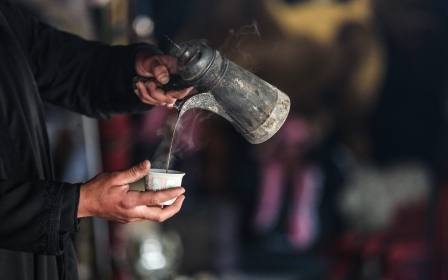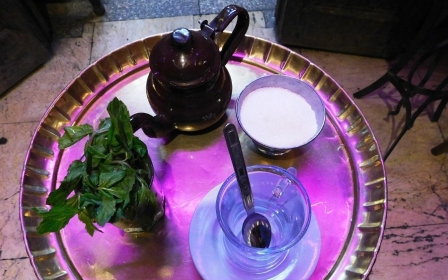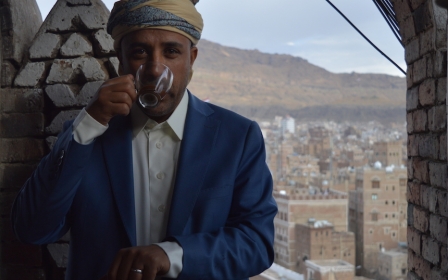In pictures: Yemeni coffee farmers gather for harvest season
Coffee is an indispensable part of the culture and lifestyle in the Middle East and North Africa. Travelling from the horn of Africa to Yemen over 500 years ago, the country has since maintained its spot as one of the world's most renowned coffee producers. While coffee was originally used by Sufis as a way to keep them alert enough to perform nightly prayers, today it is served on any occasion as a recreational beverage. In Yemen, farmers still use traditional methods of growing and roasting coffee beans, using practices that have remained largely unchanged for five centuries. No machinery, chemicals or modern methods have been implemented in the process, in an effort to ensure the high quality and distinguished taste of the coffee. (All photos by Mohammed Hamoud)
In Yemen, the coffee harvesting season starts in November and lasts until late January. One of the key locations is the Manakhah region, which is located over 100km west of the capital Sanaa. The region is known for its lush green mountains and agricultural terraces. Coffee harvesting is typically done by all male members of the family, with even children taking part. Younger members of the family usually sort and turn the coffee beans in the sun, allowing them to dry.
Most of Yemen's speciality coffee is grown organically in the highlands, in altitudes above 1,800 metres. Farmers will traditionally head to the mountains early in the morning to pick the coffee cherries, working until midday, followed by a later shift that starts from 3pm until sunset. Yemeni coffee tree is green in colour, and ranges between five and six metres tall. The coffee cherries are green in colour, but take around two and a half months to ripen and turn red. It can take anywhere from one to three months to pick the cherries, depending on how large the farm is. Once picked, the cherries are left to dry in the sun on rooftops for 10 to 15 days. By allowing them to dry, the cherries become more concentrated, making the final product rich in aroma and flavour. Once they are dried, farmers split them open and collect the seeds, cleaning and preparing them. After this, the coffee beans are roasted in a pan, then ground together before being packaged and sold. The darker the coffee bean, the more aromatic and flavourful the final product will be.
According to local farmers, outside of Yemen, coffee producers separate the cherries from the fruit before drying, which produces a consistent taste. However, in Yemen, coffee is unique due to its inconsistency and irregularly shaped beans. The growers also ensure that no part of the coffee plant is wasted. Rather than throwing away the coffee husks, they are used to make qishr - a popular Yemeni coffee drink, infused with ginger and cardamom. The leaves of the coffee plant are also used to make a herbal tea.
While Yemeni coffee is renowned around the world, in recent years, farmers have faced numerous challenges in harvesting it. The war in Yemen, which has been ongoing since 2014, has impacted the industry heavily. Lower yields have left many farmers unable to secure a steady livelihood from harvesting. The impact on the economy, coupled with the restrictions imposed by the Saudi-led coalition on foreign trade and the closure of border crossings has also meant that farmers struggle to export coffee. "Shortage of water to irrigate our farms, and the little rainfall is also a challenge," Kamal al-Nahmi, a coffee farmer told Middle East Eye.
In recent years, the price of coffee has declined, leaving many farmers without a profit incentive to produce and therefore leaving them unable to take care of their families. Many have resorted to abandoning the industry altogether and instead growing alternative crops, which they hope would be more lucrative.
Despite the challenges farmers face, coffee is highly revered in the country, with events and festivals dedicated to the potent drink. On 3 March, Yemenis celebrate a Mocha Festival, to mark national coffee day. The event celebrates the cultivation of coffee in the country and is an important way of preserving the country's coffee growing heritage.
To inject new life into the industry, some farmers have been experimenting with flavours by infusing spices like cinnamon into their coffee after the bean has been cultivated.
Before the coffee is taken for grinding, it is first sorted. Once the cultivation process is complete, the coffee is shipped off to different cafes, shops and markets. One popular cafe, named Haraaz Coffee, which is located in the centre of the capital Sanaa, offers a vast range of coffee. The hangout attracts lots of families, friends and couples come through its doors, some opting for iced coffee drinks while others go for the more traditional Arabic coffee.
While some opt for traditional strong coffee, others prefer to go for coffee that is infused with different flavours, from cardamom to ginger or chocolate. The cafe has plenty of options to choose from, which can even be mixed and customised for fans of the beverage. Some of the most popular drinks on sale at the cafe include Cortado, flat white, Turkish coffee, caramel latte and Spanish latte. Customers also have the option of buying fresh coffee beans to take home.
The cafe is modern in design, but also has murals on the wall, depicting coffee harvesting and farmers. The coffee industry is a key part of Yemeni culture and heritage, and a source of pride for its people. The manager of the coffee shop, Ghalib Jermaan, says that he considers the cafe a significant achievement. "The establishment of this cafe is thanks to the encouragement of coffee farming in the country, and slowly decreasing the amount of khat plants," he told Middle East Eye.
Khat is a plant that is a stimulant, and is chewed across many parts of Africa and Yemen. However, in recent years, people have been raising concerns about its negative impacts on peoples' health. Jermaan believes that by establishing the coffee industry in Yemen, people will rely less on growing khat for income. "Now, coffee culture is part of every Yemeni household," he says.
Other drinks and desserts are also on offer, including both traditional and international favourites. The space has become a hub for social gatherings with regulars praising the distinguished taste of the beverages. The coffee show is not only well known for its speciality coffee, but it also distrbutes coffee plants to some regions of Yemen, to encourage people to grow coffee instead of khat.
Middle East Eye delivers independent and unrivalled coverage and analysis of the Middle East, North Africa and beyond. To learn more about republishing this content and the associated fees, please fill out this form. More about MEE can be found here.




